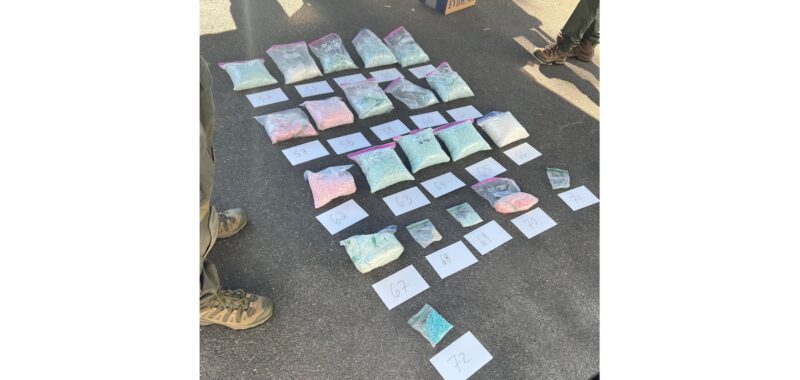In a nondescript garage in Connecticut, a New Haven man manufactured hundreds of thousands of counterfeit pills containing methamphetamine, a powerful opioid and other illicit drugs that he shipped around the U.S. and gave to local dealers to sell on the streets, new federal grand jury indictments allege.
Federal law enforcement officials announced the criminal indictments against the man and six other people on Monday, calling the case one of the largest counterfeit pill busts ever in New England.
Kelldon Hinton, 45, is accused of running the operation from a rented garage he called his “lab” in East Haven, about 5 miles (8 kilometers) from downtown New Haven, using drugs and pill presses he bought from sellers in China and other countries, federal authorities said.
Officials said Hinton shipped more than 1,300 packages through the U.S. mail to people who bought the pills on the dark web from February 2023 to February 2024. He also gave pills to associates in Connecticut who sold them to their customers, the indictments allege.
The six other people who were indicted are also from Connecticut.
Hinton sold counterfeit oxycodone, Xanax and Adderall pills that contained methamphetamine and protonitazene, a synthetic opioid that is three time more powerful than fentanyl, federal officials said. The tablets also contained dimethylpentylone — a designer party drug known to be mislabeled as ecstasy — and xylazine, a tranquilizer often called “tranq.”
Hinton and four others were arrested on Sept. 5, the same day authorities with search warrants raided the East Haven garage and other locations. Officials say they seized several hundred thousand pills, two pill presses and pill manufacturing equipment. One of the pill presses can churn out 100,000 pills an hour, authorities said.
A federal public defender for Hinton did not immediately return an email seeking comment Monday.
Federal, state and local authorities were involved in the investigation, including the Connecticut U.S. Attorney’s Office, the Drug Enforcement Administration, the FBI, the U.S. Postal Inspection Service and state and local police.
“This investigation reveals the constant challenges that we in law enforcement face in battling the proliferation of synthetic opioids in America,” Connecticut U.S. Attorney Vanessa Roberts Avery said in a statement.
Fake prescription pills containing fentanyl and other powerful opioids are contributing to high numbers of overdoses across the country, said Stephen Belleau, acting special agent in charge of the DEA’s New England field division.
“DEA will aggressively pursue drug trafficking organizations and individuals who distribute this poison in order to profit and destroy people’s lives,” he said in a statement.
Authorities said they were tipped off about Hinton by an unnamed source in June 2023. Law enforcement officials said they later began searching and seizing parcels sent to and from Hinton and set up surveillance that showed him dropping off parcels at a post office. Investigators also said they ordered bogus pills from Hinton’s operation on the dark web.
Hinton has a criminal record dating to 1997 that includes convictions for assault, larceny and drug sales, federal authorities said in a search warrant application.
About 107,500 people died of overdoses in the U.S. last year, according to the Centers for Disease Control and Prevention. That’s down 3% from 2022, when there were an estimated 111,000 such deaths, the agency said.
The country’s overdose epidemic has killed more than 1 million people since 1999.

